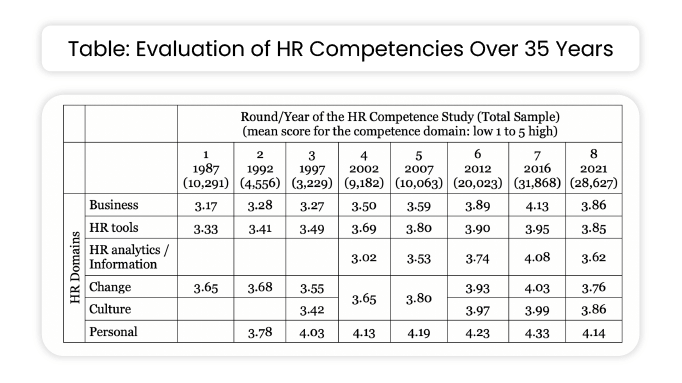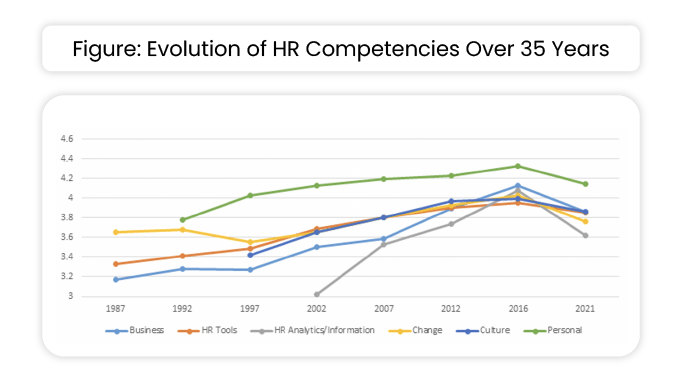How HR Must Rise to Today’s Opportunity
The 2020–2021 crises (global health pandemic, political toxicity, social injustice, digital 4.0, emotional malaise, and economic uncertainty) could be called the people/organization crises.
And in these last 18 months, the business context has placed human capability challenges even more central to how organizations deliver value to all stakeholders (employee well-being, strategic reinvention, customer share, financial performance, and community reputation).
As a result, HR professionals have the unique challenge to “rise to the opportunity” of increased expectations. Consider a simple metaphor from American football: a backup quarterback has high status but is not fully accountable to contribute. But when the starting quarterback is hurt, the backup either rises to the opportunity or stumbles into irrelevance.
Consider Tom Brady. He was the 199th pick in the 2000 NFL draft, which was put into play when the starter was injured, and he became perhaps the best quarterback in history.
The people/organization crises have made human capability a central business agenda and raised expectations on HR professionals. When more is expected, more must be delivered.
Think of two restaurants, a diner, and a fine dining experience. Which restaurant gets more customer complaints? Inevitably, fine dining because of higher expectations.
As expectations have risen for HR in the current crises, HR professionals need to “rise to the opportunity.”
Our data in the HR Competency Study (HRCS) show that for the first time in 35 years of tracking perceived HR competencies, raters scored HR professionals somewhat lower in the recent (2021) 8th round of our research compared to the seven previous rounds.
In the table below, while the specific HR competence domains have varied somewhat over time, six overall competence domains exist with a similar performance pattern (see rows). The figure captures the data from the table and visually demonstrates the consistent pattern of HR improvement and then-recent decline.


Screenshots Courtesy: Dave Ulrich
These data may be interpreted in a variety of ways, but one message might be that while the people/organization crises of 2020–2021 are raising expectations for HR professionals (think of Tom Brady), opportunities are not being realized (think of the restaurants).
With others, I see some HR professionals adding enormous value, but I worry that the overall HR profession may miss an opportunity for impact.
Let me offer four suggestions to help HR professionals rise to today’s opportunities.
1. Look forward and not backward.

HR has been on a journey towards impact and relevance for many decades.
In each stage of this journey, HR has acquired a number of insights by overcoming obstacles. But building on progress is more helpful than revisiting obstacles.
For example, in the 1990s in leading companies, HR worked to get “invited to the table” and join the management team as a business partner, player, or leader (pick your term).
Some want to revisit this agenda to get invited to business discussions so that they do not have to attend to the challenge of responding to today and tomorrow’s opportunities. HR is already invited to the table in most cases.
The question for HR professionals should now be,
What do I uniquely bring to a business discussion to help deliver results that matter?
2. Attend to patterns and not events.

Wanting to respond to today’s immediate troubles is easy, seductive, and even important for HR.
For example, when COVID began, the crisis du jour was helping employees work at home by accessing technology, finding a space to work, managing work/home boundaries, etc.
While HR has to respond to such operational crises, framing today’s events in the context of principles that will create longer-term patterns is more important.
While needful to set up a home office, the enduring principles of how to create employee experience through believing (meaning/purpose), becoming (learning/ growth), and belonging (relationship/community) no matter where employees work to shape a long-term agenda that delivers sustainable results.
Human capability principles move beyond a singular focus on people (called talent, competence, employees, or workforce) to a broader human capability contribution that includes organization (called culture, capability, system, or workplace).
When engaged in business discussions, HR should seek to upgrade both people and organization by asking,
What are the principles that will guide our choices to improve human capability today and in the future?
3. Focus on results and not activity.

To measure training efficacy, many once tracked how many employees received 40 hours of annual training.
With a little more thought, this metric shifted to assessing the impact of training on outcomes that mattered. HR needs to evolve from delivering activities to guiding outcomes. An HR activity agenda often starts with:
- what HR does (e.g., new technology app created, process designed, or competence acquired),
- then moves to how well the activity is done compared to someone else (benchmarking), and,
- then moves to identify the best practices of others who do the activity well (predictive analytics).
While this activity agenda helps HR know who they are and how they are doing relative to others, it may not lead to results that matter.
In today’s challenging world, HR should provide guidance to know which human capability initiatives will add value to the specific stakeholders of their unique company with the question,
Which human capability investments will best deliver the right outcomes?
4. Use the information to make knowledge productive.

HR is often replete with many opinions and has often been accused of chasing shiny objects, the latest fad, or the silver bullet with quick-fix solutions.
To rise to opportunity, HR needs to move beyond quick fixes to make knowledge productive through:
- Theory (why things happen so that they can be replicated)
- Research (what happens based on studies so that patterns can be shaped), and
- Practice (how things can happen better). HR can start with the question, “What information do I offer to deliver outcomes that matter?”
These suggestions (please add others) help HR rise to the opportunity of today’s context, reinvent HR for the future, and require courage and agility to implement.
While I see, honor, and learn from many exceptional HR professionals who have risen to today’s opportunities, I hope that as a profession, HR avoids pitfalls and lives up to the maxim that the best is yet ahead.
This is a repost of Dave Ulrich's original LinkedIn article. All necessary permissions have been obtained from the author.















